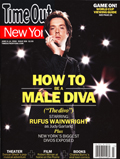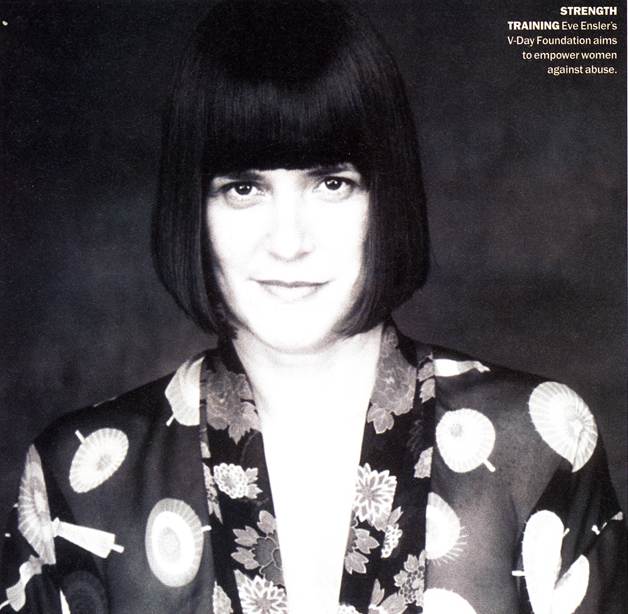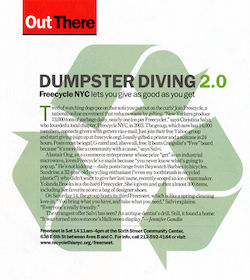Time Out New York: Eve Ensler
 Friday, June 9, 2006 at 12:18AM
Friday, June 9, 2006 at 12:18AM 
June 8 - 14, 2006 issue
Antiviolent femme
Eve Ensler fights domestic violence with a citywide awareness festival.
Ten years ago, Eve Ensler stormed a New York stage to demand freedom for vaginas everywhere. Since then, she's been focusing on another type of female empowerment: freeing women from the dangers of domestic violence. After the success of The Vagina Monologues, Ensler launched the V-Day Foundation in 1998, an organization that raises money and awareness by producing benefit performances of The Vagina Monologues all over the world every February. (The V stands for victory, valentine and, of course, vagina.) Next week, she's focusing her mission here at home, where V-Day started, with Until the Violence Stops: NYC, a two-week five-borough arts festival that combines celebrity power with local activism.
"We want to essentially occupy New York," says Ensler, who spoke with TONY after a May 18 City Hall press conference announcing the event. To do that, Ensler dreamed up a festival of theater, spoken word, film and performance, and then used her reputation as a both a writer and actor to attract big-name talents. Jane Fonda, Phylicia Rashad and Marcia Gay Harden will read Ensler's 2001 play about women and war, Necessary Targets which kicks off the series on Monday 12. On June 19, writers Edwidge Danticat, Edward Albee, Howard Zinn and Alice Walker are among those who'll contribute original works to "A Memory, A Monologue, A Rant and A Prayer," where they will be read by Cynthia Nixon, Rosario Dawson and Isabella Rossellini. And on June 21, Salma Hayek and Rosie O'Donnell perform essays written by women in federal prisons across the country. Several other "marquee" events (as they're called on the website) feature similarly star-studded casts: Marlo Thomas, Idina Menzel, Kerry Washington and Brittany Murphy. On the grassroots side, V-Day called on dozens of local groups to participate. The result is more than 35 community events, including a self-defense class on Wednesday 15, a panel discussion with women from global conflict zones on Tuesday 13 and a domestic-violence information forum on June 17.
On the grassroots side, V-Day called on dozens of local groups to participate. The result is more than 35 community events, including a self-defense class on Wednesday 15, a panel discussion with women from global conflict zones on Tuesday 13 and a domestic-violence information forum on June 17.
And UTVS won't ignore the fellas. V-Day Men (a committee made up of male leaders in domestic-violence prevention, such as Jackson Katz, author of The Macho Paradox: Why Some Men Hurt Women and How All Men Can Help) has developed "V-Day Men @ Work," a symposium that explores the roots of violence toward women The June 24 workshop also includes a creative session during which the guys will be encouraged to express their feelings about domestic violence and male gender roles. Then some of these works will be presented at It's Hard Out Here for a Girl" on June 25.
"V-Day was born in New York City, and Until the Violence Stops: NYC takes our message directly to the people of New York," Ensler told the crowd assembled at the press conference, which also featured Mayor Bloomberg. The city itself is helping to spread that message through its own subway and bus ad campaign that graphically depicts abused women. The statistics are even worse than the photos: One out of every eight homicides in New York City is due to domestic violence. "We can't hide from the brutality of these crimes," said Bloomberg.
V-Day's efforts are helping, though. Ensler noted that rates of rape went down in areas where V-Day has presented programs, and that the organization has also raised funds for community-abased antiviolence programs and safe houses in places as far-ranging as Kenya, Egypt, Iraq and South Dakota. "It's clear that we're having an enormous impact," she told the crowd. "But [violence against women] is still the issue that people get to later, when they're done with the other issues." Across the globe, Ensler has been inspired by thousands of women who have been victimized. "Instead of picking up AK-47s or machetes, they dedicate themselves to eradicating violence," she explains. "They're full of a wild, extraordinary energy. It's contagious." She's hoping this festival will fire up a similar ardor here at home.

 Bracco, 30, produced her first reading in 2003, in support of Poets Against the War. It went well, but she worried that the antiwar community would disperse when the war got off to a smooth start, so she decided to diversify into other causes. "Had I known how long [the war] would last, I might have kept organizing those events," she says. Instead, she used that first reading as a springboard to an annual series. Since then, while working various day jobs, she's produced two more "Poetic People Power" evenings dealing with, respectively, voting and democracy, and the environment.
Bracco, 30, produced her first reading in 2003, in support of Poets Against the War. It went well, but she worried that the antiwar community would disperse when the war got off to a smooth start, so she decided to diversify into other causes. "Had I known how long [the war] would last, I might have kept organizing those events," she says. Instead, she used that first reading as a springboard to an annual series. Since then, while working various day jobs, she's produced two more "Poetic People Power" evenings dealing with, respectively, voting and democracy, and the environment.
 And Cassa has been witness to Clinton Hill's evolution since he moved there in 1940. "My life has been very historical," he says, perhaps referring to his spoon rests, or perhaps his birthplace ("Union Street -- where Al Capone came from"). The spoon rest collection started in 1970, when Cassa's wife Katie – whom he met at a dance in Fort Greene Park in 1940 – brought home a sky-blue spoon rest from the couple's cruise to the Bahamas. After her death in 1992, Cassa continued Katie's collection to honor her memory. Friends and family brought home spoon rests from far-flung vacation spots – enough to garner Cassa a place in the Guinness Book of World Records in 1998. But he shares the glory with the woman who started it all, saying, "When I get to 700, I'm going to inscribe on Katie's tombstone – GUINNESS BOOK WORLD RECORD HOLDER."
And Cassa has been witness to Clinton Hill's evolution since he moved there in 1940. "My life has been very historical," he says, perhaps referring to his spoon rests, or perhaps his birthplace ("Union Street -- where Al Capone came from"). The spoon rest collection started in 1970, when Cassa's wife Katie – whom he met at a dance in Fort Greene Park in 1940 – brought home a sky-blue spoon rest from the couple's cruise to the Bahamas. After her death in 1992, Cassa continued Katie's collection to honor her memory. Friends and family brought home spoon rests from far-flung vacation spots – enough to garner Cassa a place in the Guinness Book of World Records in 1998. But he shares the glory with the woman who started it all, saying, "When I get to 700, I'm going to inscribe on Katie's tombstone – GUINNESS BOOK WORLD RECORD HOLDER."

 Alastair Ong, an e-commerce entrepreneur whose prize "get" is an industrial microwave, loves Freecycle's e-mails because "you never know what's going to pop up." He's not kidding—daily posts range from Baywatch Barbies to bicycles. Sandrine, a 32-year-old recycling enthusiast ("even my toothbrush is recycled plastic!") who didn't want to give her last name, recently scored an ice-cream maker. Yolanda Brooks is a die-hard Freecycler. She's given and gotten almost 300 items, including her favorite score: a bag of designer shoes.
Alastair Ong, an e-commerce entrepreneur whose prize "get" is an industrial microwave, loves Freecycle's e-mails because "you never know what's going to pop up." He's not kidding—daily posts range from Baywatch Barbies to bicycles. Sandrine, a 32-year-old recycling enthusiast ("even my toothbrush is recycled plastic!") who didn't want to give her last name, recently scored an ice-cream maker. Yolanda Brooks is a die-hard Freecycler. She's given and gotten almost 300 items, including her favorite score: a bag of designer shoes.